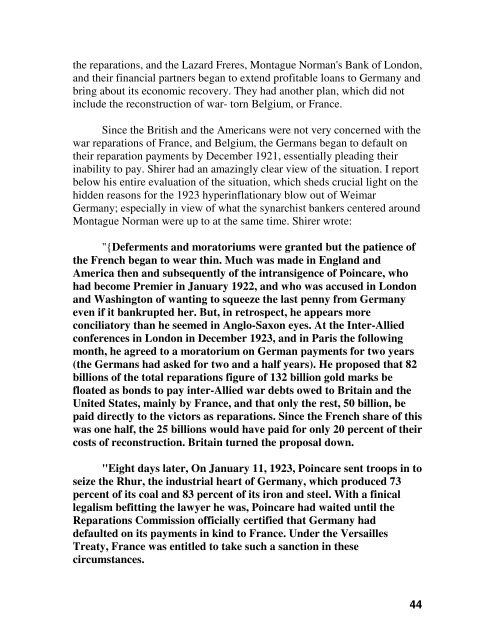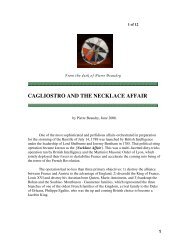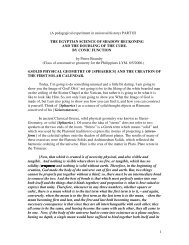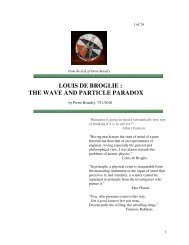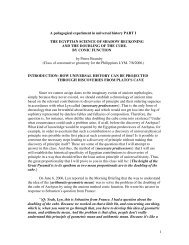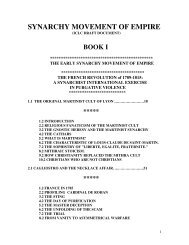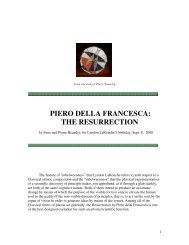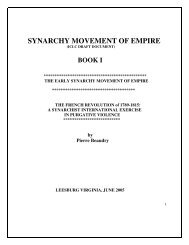synarchy movement of empire book ii - Pierre Beaudry's Galactic ...
synarchy movement of empire book ii - Pierre Beaudry's Galactic ...
synarchy movement of empire book ii - Pierre Beaudry's Galactic ...
You also want an ePaper? Increase the reach of your titles
YUMPU automatically turns print PDFs into web optimized ePapers that Google loves.
the reparations, and the Lazard Freres, Montague Norman's Bank <strong>of</strong> London,<br />
and their financial partners began to extend pr<strong>of</strong>itable loans to Germany and<br />
bring about its economic recovery. They had another plan, which did not<br />
include the reconstruction <strong>of</strong> war- torn Belgium, or France.<br />
Since the British and the Americans were not very concerned with the<br />
war reparations <strong>of</strong> France, and Belgium, the Germans began to default on<br />
their reparation payments by December 1921, essentially pleading their<br />
inability to pay. Shirer had an amazingly clear view <strong>of</strong> the situation. I report<br />
below his entire evaluation <strong>of</strong> the situation, which sheds crucial light on the<br />
hidden reasons for the 1923 hyperinflationary blow out <strong>of</strong> Weimar<br />
Germany; especially in view <strong>of</strong> what the synarchist bankers centered around<br />
Montague Norman were up to at the same time. Shirer wrote:<br />
"{Deferments and moratoriums were granted but the patience <strong>of</strong><br />
the French began to wear thin. Much was made in England and<br />
America then and subsequently <strong>of</strong> the intransigence <strong>of</strong> Poincare, who<br />
had become Premier in January 1922, and who was accused in London<br />
and Washington <strong>of</strong> wanting to squeeze the last penny from Germany<br />
even if it bankrupted her. But, in retrospect, he appears more<br />
conciliatory than he seemed in Anglo-Saxon eyes. At the Inter-Allied<br />
conferences in London in December 1923, and in Paris the following<br />
month, he agreed to a moratorium on German payments for two years<br />
(the Germans had asked for two and a half years). He proposed that 82<br />
billions <strong>of</strong> the total reparations figure <strong>of</strong> 132 billion gold marks be<br />
floated as bonds to pay inter-Allied war debts owed to Britain and the<br />
United States, mainly by France, and that only the rest, 50 billion, be<br />
paid directly to the victors as reparations. Since the French share <strong>of</strong> this<br />
was one half, the 25 billions would have paid for only 20 percent <strong>of</strong> their<br />
costs <strong>of</strong> reconstruction. Britain turned the proposal down.<br />
"Eight days later, On January 11, 1923, Poincare sent troops in to<br />
seize the Rhur, the industrial heart <strong>of</strong> Germany, which produced 73<br />
percent <strong>of</strong> its coal and 83 percent <strong>of</strong> its iron and steel. With a finical<br />
legalism befitting the lawyer he was, Poincare had waited until the<br />
Reparations Commission <strong>of</strong>ficially certified that Germany had<br />
defaulted on its payments in kind to France. Under the Versailles<br />
Treaty, France was entitled to take such a sanction in these<br />
circumstances.<br />
44


